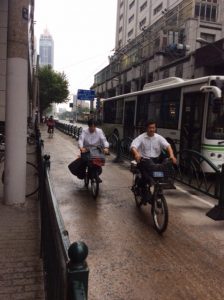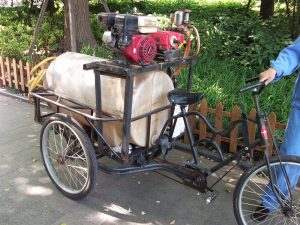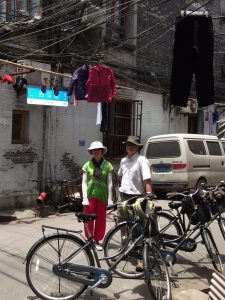Greetings to you, currently on holiday in Singapore! In fact, I was so busy getting ready to head away last week that I didn’t even remember a Flashback Friday… It’s actually Singapore National Day today, so I expect to be watching a few fireworks and other displays later today. I’ve been keeping an eye on any interesting things cycling-wise while I’m here as well, so there might be a post about that in the future. But for now, let me take you back to July 2014, when guest blogger Robert was in Asia and checked out what Shanghai had to offer for biking…
Biking in other cities – How does Christchurch compare? This is the first of a series of articles that compares Christchurch with several other cities in the world.

(1) Shanghai
With a population approaching 24 million people in the greater metropolitan area and economic and social change occurring at a rapid pace, Shanghai is a vastly different place for biking than Christchurch.
The growing population is becoming wealthier so bicycle use is shadowed by a trend showing the symbol of this wealth for many people is to own and use a car. Bicycles are the transport of the lowly paid. Whilst there are plenty around, the older and poorer areas are fast being redeveloped for contemporary businesses, so car and motor-cycle numbers have increased. Road lanes have wider and more numerous to alleviate the congestion. Future traffic management is going to be a huge challenge. Public transport is generally excellent and used by those on middle incomes.
The most common way to keep bicycles separate from vehicles is the use of a fenced off lane. This lane is wide enough for bicycles and motor-scooters. Narrower side streets are generally filled with pedestrians. The rule of the jungle for all road users is vastly different from anything encountered in Christchurch.

For the price of a ticket to do a 5-second bungy jump, you can have a guided 6-hour tour of parts of Shanghai by bike. The adrenalin rush will last much longer. After an hour or two of riding, the fear subsides . You learn that there is a sense of order for those who use the roads and it goes a little like this:
1. Always look ahead and avoid anything in your path
2. Listen out for bells from behind or at the side of you and be aware when someone is close. Have a bell and use it.
3. Don’t do anything unpredictable, hesitate or show fear.
4. In general, you can ride most places. There seems to be little concern about riding on the pavement, on pedestrian crossings, through traffic lights, or riding contra-flow, as long as the above rules are followed.
This is much the routine in many cities in Asia and is the complete antithesis of what any western child learnt at school about etiquette on the roads.
Some intersections have a countdown phase in seconds. A read-out warning that the light is going to change from green to red, or red to green. Used to maintain continuous traffic flow this ‘window’ is a free for all, using the laws of the jungle as above. Tourists who walk the streets often freak out when cars, scooters, and bicycles all move through the intersection when the ‘green man’ is lit. It is necessary to remember that they will avoid you if you take care to avoid them.

So what can be learnt from a visit to Shanghai about biking that may benefit Christchurch ?
It is apparent that when space is so limited, “sharing the road” by necessity is an intimate exercise. This is a concept alien to New Zealanders in general. For the future however, if we are to achieve a vibrant and compact city without the extra costs incurred by urban sprawl, as in the past, careful planning is required. There must be a more equitable priority given to all transport options for the city to grow and remain liveable for those who choose to live centrally. Separate cycleways will be a great start and for the future, money very well spent.
Have you experienced cycling in Asian cities? What did you think?
